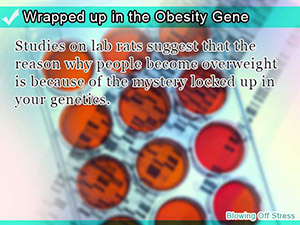One reason why you should wait before blaming themselves for being overweight is that you may be one of the many who've inherited the so called obesity gene that everyone is talking about.
In Japan, the subject is undergoing study. Results showed that among the sure mass, which it seems like, of people who don't have to do much to defeat the odds, staying fit and slim without much effort, there still are 1 of 3 people who've inherited the obesity genethrough they're genetics.
The number for people in the US with this condition is said to be much less, which is ironic because of how many people suffer from obesity. That only goes to say, maybe Japanese people are doing something right to keep their weight off.
On the other hand, if you like many others, self-proclaimed diet veterans, have tried time over time to lose weight, but fail. The reason may not be because you didn't give it your all. The problem could be explained in term of genetics.
What Is The Obesity Gene That Is Making People Gain Weight?
The obesity gene is not any one gene. Instead it describes a set of genes related to your metabolism which determines how well your body loses or gains weight.
Is what is written in your genes a sole determiner of what will happen in your life?
With a growing population in the world of people suffering from obesity, one begs to question the underlying importance that gene expression has on our diets. Attention in recent research has been turned toward finding out why there is growing concern around the world regarding obesity.
There are in fact many genes that have been recognized by researchers as related to common obesity. The sure amount of known obesity genes is well over 50. In this episode of Slism, we will discuss two genes that are thought to play a large part in expressing obesity: The beta-2 adrenergic receptor (ADRB2); and Thermogenin, which is also known as uncoupling protein 1 (UCP1).
| Obesity Gene | Function |
|---|---|
| ADRB2 | Impairs the breaking down of neutral fat (Slower metabolism) Causes unnecessary storing away of energy in the body, advantageous in the time of famine, but is now associated with obesity adjusting to modern day lifestyle. |
| UCP1 | Hinders brown adipose tissue activation making energy harder to use. (Decrease in metabolism) |
The Thrifty Gene in ADRB2
The thrifty gene is what is said to be responsible for your body going into energy saving mode. Although when your body does this, it makes do with less; however what's left over gets stored away as fat. This can be why so many have trouble balancing their weight.
Although great for in times of hunger such as the past when food was less abundant, however in modern times this only asks for people to become obese.
The thrifty gene that makes it easy to become obese is said to be found in 1 in every 3 people in Japan. People who have inherited this gene shouldn't follow a 2000 calories a day diet plan.
Adverse effects of UCP1
It is said that as much as 1 in every 4 peoplehold the UCP1 gene. It hinders the functionality of brown fat cellswhich activate to help burn off more fat, turning fat into usable energy through thermogenesis heating your body when you are cold. This in turn makes it harder to burn off fat and energy which only beckons gaining weight.
Does Having The Obesity Gene Mean Being Overweight Is Your Destiny?
Your genetic code isn't something that you can change in your lifetime; however that does still not mean it determines your destiny. With that said, does being born with the obesity gene mean no matter how much your try to lose weight there is no hope?
What can people who have inherited the obesity gene do to change the outcome of their diets?
No, just because you may have the obesity gene that doesn't necessarily mean you are fat. At that can be said is that your body is more prone to gaining weight than other without the gene. It doesn't mean that dieting and losing weight won't work out for you.
Even if you have a slow metabolism, there is still a chance that regular exercise and healthy eating will pay off. So don't sell yourself short just yet, if there is a will there is a way. The same goes with your diet.
People with the thrifty gene are said to be more likely to put on visceral fat (fatty tissue underneath your muscles) which if let go unmanaged can lead to other health related problems.
Trusting Genetics to Find the Diet That's Right for You
In recent years, DNA test kits for personal use, a technology once only available to institution with substantial budgets. Nowadays, there are more and more opportunities check up on your own genetic code.
How do I find out if I have the obesity gene?
Take a sample of your saliva and send it out for DNA testing. It's that easy. After getting your results you should be able to tell if you have the obesity gene and will have hints on how to make your diet more effective.
What kind of diet and exercise is fit for people with the obesity gene?
The gene mutations you need to look out for when you get your results back from DNA testing includes the previously discussed, ADRB2 and UCP1. In addition, you should keep an eye out for what is considered an anti-obesity gene, beta-3 adrenergic receptor (ADRB3).
People with ADRB2 are prone to get fat by sugar; whereas people with UCP1 are prone to get gain weight with fat. The synergy of these two gene mutations make people inheriting these gene likely to gain weight without managing what they eat.
For those who've had the experience of trying diet after diet to only find out that it's not working out, getting a DNA test done would help break down the diet that is right for you down to a science.
Similarly to the way you would turn to your genetics to gain insight in your diet, looking at you blood type has grown widespread in Japan. You would be surprised to find out how your ABO blood type matches your current diet.
Who wouldn't want to be blessed with the anti-obesity gene?
Everybody has a friend that no matter much he or she eats just doesn't gain weight. Where does it go?As much as it would be simpler to believe that there is a black hole where all this food goes, for a real explanation one must turn to genetics.
Those who are fortunate enough to have inherited the ADRB3 gene, have fast metabolism are considered less likely to become obese.
As an offshoot of the Human Genome project, Japanese researches and others around the world for that matter have been trying to bridge genetics and weight related issues to better understand why global obesity is a problem with growing concern.








